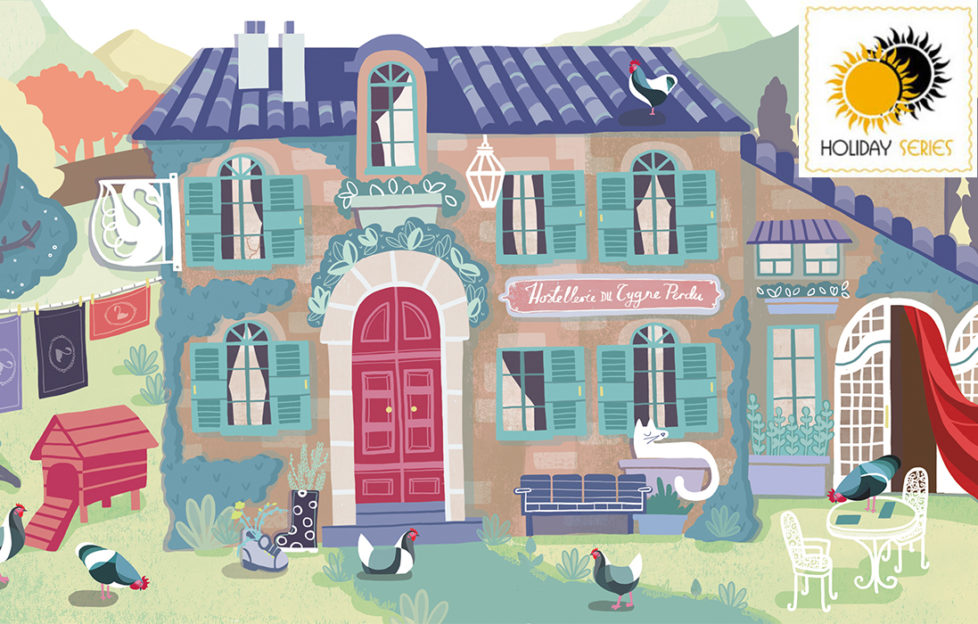Hotel Of The Lost Swan

Throughout the long, shimmering, quiet summer in a remote French valley, Gerard never gives up hope of a late booking…
Gerard Morreade had sent a taxi to Toulouse to ensure that six Faverolles chickens retiring to his Hostellerie were given safe passage.
The dawdling of a freight train had caused the delivery to miss its connection and the chickens would have been stuck in Toulouse for another day.
They were saying down in the kitchen that morning that Gerard must have lost his mind. Toulouse was a 260-mile round trip; this was his utmost extravagance.
Chef in particular thought it gave the wrong impression to look as if they were so starving for guests that they would journey over the mountains to speed the best chickens back to the wilds.
Yet Gerard’s decision was quite deliberate, because in hotel circles at least, a legend applies to the Faverolles. The hens are such prolific egg-layers that it is widely believed a supply-and-demand rule follows their homing.
Gerard’s dearest wish was that their arrival would bring about an end to a bad season and foretell the appearance of guests.
A wide valley is carved through the hills that surround the Hostellerie du Cygne Perdu, which is crowned on two sides by the ruins of castles. That circuit of castles is further overlooked by a chain of magnificent peaks.
The hamlet in the middle is called Châteaux Cachent, which means hidden by castles.
It is a dot on the map discernible with a magnifying glass amongst the vast expanse of green denoting the Parc National des Pyrénées.
Springs, summers and autumns are long and hot here, and winters usually so wet and mild that even a stick will grow.
As for people, only those who are determined to get right out into the sticks ever make it as far as Châteaux Cachent. Only those seeking silence and peace, only the broken-hearted, the convalescing, along with hikers, cyclists, photographers, and the type of person who comes especially to see the castles.
In this season of 1992 there was a dearth of the usual stragglers at the Hostellerie. There were no empty key shelves behind the reception desk, or any entries recorded in the diary to break up the blank page.
The leaves remained unturned and of the two lines for the phone, the one for reservations had fallen silent.
Things were dispiriting for the staff without the trickling stream of visitors to attend to.
And surely for a guest, staying in a hotel is the closest you can get to childhood as an adult. Nothing is your responsibility; not your washing or your cooking or picking up after yourself, and you don’t even have to make your own bed.
None of the services of bliss were required in an empty establishment.
And after almost two months without footfall, Gerard had begun to wonder whether the last guest who had stayed some eight weeks previously would prove to have been the last one ever to enter the building.
Yet he put the barren time to good use and had spent the last months making checks inside the Hostellerie, spraying fresh flowers around the place and getting on with the niggling repairs. It was an occupation he found well suited to the long siege of a fruitless season.
Everything was always kept ship-shape. Each of the public rooms offered cool, shady spaces to retreat, and the promise of a clean bed and home cooking.
For what does a traveller need to thrive but food, water, warmth and rest? And all Gerard Morreade needed was a single solitary guest.
In the mid-70s, at the age of eighteen, he had wandered the earth in blue high-heeled shoes with silver buckles, perfectly gauche and full of promise. A white boy with an Afro, a Paisley scarf round his neck, tangerine silk shirt and purple bell bottom trousers, wondering why no one took him seriously, when he was kind, he was affable, he was generous, and above all else, Gerard was flamboyant.
Leave an old pair of shoes outside for too long and Gerard would put soil in them and pot a plant. Deliver him a box of fruit and he would produce a display worthy of the campest greengrocer.
Cats came to sunbathe in his window boxes and he offered passing shepherds homemade tisane.
Cut him in half and his bones would read “hotelier”.
At one time there were two hotels in his childhood hometown of Saint-Victurnien and his mother had owned both of them.
Just after lunchtime he happily stopped scrutinising the accounts book to welcome the shipment of Faverolles, who arrived in a flurry of clucking and calling; salmon and lace snowy-breasted sweethearts, full of delight.
Chef Luigi and the kitchen porter, Boyet, followed Gerard as they made a procession crossing through the garden, carrying the new arrivals carefully to set them free in their pasture.
“They’ll keep us going through the winter,” said Gerard. “And the cockerel is on the quiet side about his morning call and so he won’t wake sleeping guests.”
A hopeful expression crept over Luigi’s face, to which Gerard replied, “Two cleaners, two gardeners and six chickens today… but no guests.”
Boyet, a spindly boy with plasters on his fingers, patted Chef’s shoulder to encourage him to get on with things anyway. Luigi heaved a sigh and headed down to his citrus groves with the watering cans, his sandals softly smacking against his heels.
His wife, the housekeeper Guinivera, was washing the Hostellerie doorstep. She was one of those brisk little white-haired women you see cleaning other people’s houses.
She smelled of Vim and Flash and all things piny and she always carried sweets in her pockets.
At twilight, Gerard moved around the building switching on the lamps, adjusting the windows to keep the insects out, and sweeping briefly over the reception hall to banish any dust from forgotten corners.
He loved the transformation of the spaces, morning and evening, as if by a magician.
And by this time there were never any traces left of any of housekeeping’s daily endeavours, no fresh mopped floors, no lurking buckets of dirty water, not a stain on a tile.
As the daylight faded he went upstairs to place a jar of shortbread on the bedside table in room eight, one of four rooms which he had selected to be in readiness for immediate occupancy.
He imagined a late arrival might not wish to take dinner, but just get up to their room and have a shortbread finger – spend some time in bare feet.
Gerard prided himself on his intuition, a skill fine-tuned after a lifetime spent in the observation of guests.
He closed the window and switched on the wall lamps to check the bulbs, dimly lighting up crystal clusters of tulips.
Looking out of the window, he noticed there was a small cracked pane with a Sellotape repair.
All he could see on the other side of it was a chain of sombre hills.
In a building of such majesty as the Hostellerie du Cygne Perdu, there was always going to be the odd oversight: the occasional dripping tap, creaky floorboard or lime scale peak. This was, after all, his home.
Such a slip as the crack in the glass would add to the character of his establishment, he hoped, but noted the repair on his list.
Standing for a moment, absent-mindedly he dust-checked the top of the light switch. It squeaked to attention.
He felt satisfied that the bedroom was clean and smelled divine, of laundry, fresh polish and waxed wood.
He had the peculiar feeling that he was being watched, which is so particular to old houses.
In addition he was conscious that someone coming from a city might also be mindful of the fact that they couldn’t hear any footsteps or the random voices of strangers outside in the corridor.
The only sounds in the room came from a symphony of crickets in the grass outside below the window, and the distant flutter of the Faverolles hens bedding down for the night.
And when the last barks from distant dogs ceased, and the last bird had stopped singing, there came the silence which was broken only every now and then by the echoing scream of an owl.
After that nothing would be visible outside until the morning, because the trees on the tops of the ridges that wrap around Châteaux Cachent grow so tall in summer that they blot out the moon.
At first light next morning Gerard awoke in his room which was dotted with soft sunrise shadows, his drowsing pleasure the distant crow of his new cockerel. Five-thirty, when the world still belongs to the birds.
Only half awake, he felt he could recall being a shooting star, a blade of grass and a snail. Though each day, in the absence of guests, it seemed to take a little longer to remember what he was supposed to do as regards the Hostellerie.
He headed shower-wards, turning himself out from bathroom and dressing table, scented and suited.
His routine was to soak in the bath and then shower for five minutes, twice a day.
Even when he was a child, his disciplinarian mother had insisted on his keeping the most clean-cut standards of grooming, little knowing that she was instilling in him the habit of being a little over-bathed.
Downstairs the morning air was infused with the scent of a few baking croissants chef Luigi had reluctantly swiped into the oven, and of the filigree heads of an unknown white flower outside on the trees.
An army of polished glasses in a wooden dresser at the far side of the restaurant chimed as Gerard passed by: Gerard’s soldiers.
He sat for a time in a corner in the restaurant by some open French doors, looking out into the gardens; watching the heat rising from the roof of a pergola, moving like invisible flames of air, ahead of the twinkling bricks of an old barn.
With great determination he slipped some new menus into folders, encasing everything in plastic for the ease of imagined guests.
He missed the scrape of cutlery across a plate and the soft murmur of diners. Though it cheered him up to hear the Faverolles pecking about outside and the gentle scratchings they made bathing in the dust.
The old farmer from down the lane passed by with a baby strapped to his front.
He was walking along the road eating a sandwich, being followed by a flock of sheep. There was a story to be told in the image: a late child, an older father, the tragedy of a lost wife.
Gerard moved to reception to look for a pen to make a small correction on one of the menus. Boyet appeared beside the desk fresh from the garden, carrying a basket full of eggs.
“Would you like me to give some to the farmer?” he said. “We have too many.”
“Excellent!” said Gerard. “I’m sure he’d appreciate that,” he added, still searching for a pen.
The telephone rang – and the red light flashed on line two for reservations.
Gerard stopped still, looked at the basket of eggs, and then to the phone, and then he looked to Boyet and gasped.
Luigi was drawn out of the kitchen by Gerard’s exclamation. Guinivera stopped her work and followed. Boyet’s mouth dropped open and they gathered around the reception desk and watched the telephone ringing.
Gerard was so overwhelmed, he seemed unable to summon the powers of speech.
“Quickly!” Luigi urged him at last. “They’ll hang up!”
Gerard composed himself and managed to reach down and pick up the phone.
A few feet away outside, the brass plaque enthroned over the Hostellerie’s entrance sparkled in the light of a new day.
It said: Hostellerie du Cygne Perdu
M Gerard Morreade
After the epithet in beckoning italics followed the words: All Welcome.




